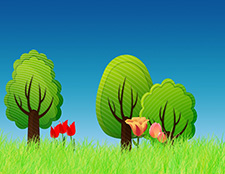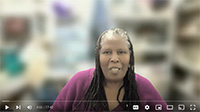Welcome to the EarthCare Module on "Understanding."

- Demonstrate an understanding of our power of spiritual Understanding as a transformation and creative spiritual power.
- Identify ways to deepen Understanding and expand our connections with each other and our planet, and to be in service to the greater good.
- Engage our power of Understanding to evoke and manifest new, creative, and powerful expressions for sustainable living on a climate-changing planet.
Divine Understanding in me enables me to move through life expressing and embodying love and wisdom. Through Understanding I remember my Oneness with Source/God/Creator and allow myself to be a force for good in our world.
I enter into an awareness of God present here and now, in me and as me. I prayerfully open to deeper Understanding, insight and comprehension. I affirm flexibility and release of rigidity so that deeper Understanding can flow into my mind and life. I claim heightened Understanding for all of humanity as we express our Divinity toward ourselves, one another, and all of nature. Giving thanks for the gift of Understanding I say and so it is! Amen.
A Deeper Understanding
By Rev. Cylvia Hayes
Spiritual understanding is about more than knowledge. We gain knowledge when we acquire facts while understanding involves interpreting and connecting those facts. In Keep a True Lent, Charles Fillmore wrote, “Spiritual understanding is the ability of the mind to comprehend and realize the laws of thought and the relation of ideas to one another…. Intellectual understanding comes first in the soul’s development, then a deeper understanding of Principle follows, until the whole man ripens into wisdom.” Such understanding can come through gradual evolution or in a flash of realization or revelation.
Humankind has been amassing amazing levels of knowledge about biology, ecology, physics, space, and how planet Earth was formed and functions. Our knowledge and ingenuity have led to technology that would have seemed completely impossible and magical to humans just a hundred years ago. However, since the onset of the Industrial Revolution we have been wielding knowledge and deploying technologies without understanding that our actions would have lasting, harmful impacts on the planet that is our home.
With the development of mechanized processes and more and more urbanized settings we have largely lost our understanding of our interdependence on all of nature, not only for physical survival but for beauty and spiritual enrichment.
Now we find ourselves in a predicament of our own making. The oceans are filled with plastic from our waste and plastic is now entering the food web and our own bodies. A new phenomenon, known as “forever chemicals,” were created by chemical companies and they are now found in water supplies all across the globe. By weight, there is now more cattle, sheep, and pigs than wildlife. And the enormous release of fossil fuel related emissions has changed the chemistry of Earth’s atmosphere, leading to a warming planet and much more extreme weather events.
We have reached a point where we need to deepen our understanding of humanity’s place within nature. Humans are not apart from nature, as Western consumerism and a conventional interpretation of the dominion scripture teaches, but a part of nature.
Understanding is a deep form of knowing, but paradoxically, understanding can be deepened by questioning what we think we know, by staying open to the possibility that there is more going on than what our physical senses reveal. Sometimes human-level understanding cannot fully grasp the truth of a circumstance or event. In Adventures in Resilience, Sharon Connors writes, “Spiritual understanding gives us the vision to see through the mists of our experience to the highest, most life-enhancing Truth. It helps us find the miracle and meaning in the mess. In this awareness, we can make informed decisions about our responses to people and life circumstances rather than reacting.”
Some of our most profound periods of growth occur when our existing level of understanding is deeply challenged, when we enter into a liminal phase. I wrote about my own liminal experience in my book, When Life Blows Up: A Guide to Peace, Power and Reinvention. Below is an excerpt:
In anthropology, in the study of cultures that have clear rites of passage rituals, there is a concept known as the liminal phase which is the point in a profound, life-stage ritual in which the initiate has lost their old identity and place in society but has not yet been granted the new status and been reintegrated into society. More recently liminality has crossed over from anthropology into psychology and is used to describe when a person suffers major life upheaval that shakes us loose from our familiar position in community or society. This is usually a very challenging space for a person to remain in because it is detached from familiar routines and social interactions and support. The sense of liminality, of being in between the old and new way of being, often hits us when we experience sudden, intense life-changing events. This can happen when a young person moves off to college, when we retire from a career, when someone gets released from prison or when we suffer serious prolonged illness, death of a loved-one, loss of social standing or bullying and ostracism.
I would argue that the human species is in a stage of collective liminality in our understanding of our place within, and relationship to, the natural world. It is a challenging and unsettling time, but it contains hope for the evolution of our worldview and the creation of a civilization that works better for all beings.
Lesson Engagement
 This video talk is available for your personal use or for viewing in your congregation (in-person or online). The speaker is Rev. Linda McLead. Click here to contact Linda.
This video talk is available for your personal use or for viewing in your congregation (in-person or online). The speaker is Rev. Linda McLead. Click here to contact Linda.
 Content by Rev. Cylvia Hayes
Content by Rev. Cylvia Hayes
Due to mounting pressure from environmentalists and many countries, the International Seabed Authority (ISA) has delayed efforts to move forward with deep sea mining. The ISA has, for now at least, decided to adhere to the “Precautionary Principle”, in which it is agreed that human activities with unknown impacts on the environment will not be allowed to forward until, and if, it can be proven that those activities will not cause irreparable harm. Far too little is known about our deep seas, the seabed, ecosystems, and species that live there to be able to assess the impacts of extractive mining.
Podcasts
An interview with Daniel Wildcat, author of “On Indigenuity, Learning the lessons of Mother Earth”. What can Native American knowledge teach us about climate change and the environment? Dr. Daniel Wildcat of Haskell Indian Nations University joins us to talk about his new book, On Indigenuity: Learning the Lessons of Mother Earth.
Quotes
“First there is weeping, for we all must weep for what we have lost. Second comes silence, for in the silence we understand solace, beauty, and comfort from something greater than ourselves. Third comes singing, for in singing we pour out our hearts and regain our voice.” – Judy Collins
“How to be Resilience: 1. Accept what is happening 2. Positive thinking - I CAN do 3. Silent affirmation affirming things are OK. 4. Relax (you've let go). It is NOT my place to understand WHY, I am here to serve, honor, respect. State, I'm Living from a Place of Surrender.” – process by Michael Singer
“What I see in Nature is a grand design that we can understand only imperfectly, one with which a responsible person must look at with humility.” – Albert Einstein
Videos
Indigenous persons’ explanation of “Land Acknowledgement”. This video accompanies #HonorNativeLand – a guide and call-to-action to spread the practice of acknowledgment of traditional Native lands at the opening of all public gatherings.
Our Only World. The Studio Nova.
Our Only World UK version. The Studio Nova
These music videos are an inspiration for the young and young at heart! Watch the Young Actors Krew (YAK) from Western North Carolina move on an anti-litter campaign to clean up our natural waterways and surroundings. Versions of this video will be produced from countries spanning the world to create a movement against single use plastics and irresponsible disposal of waste. This is the U.S. contribution to that vision. This video is a partnered production with Corinne Gerwe of The Mountain Page Theatre and Music/Lyrics by David Smart. Video Production by The Studio Nova.
Other
Tips for Addressing Climate Anxiety
Unity of Walnut Creek, California, one of EarthCare’s Wayshower Congregations, has developed
several programs and resources that promote an environmentally socially just world that is free
from oppression promotes understanding that we all are one. They are:
- An 8-week zoom class entitled White Fragility, by Robin J. DiAngelo.
- A 7-week zoom class entitled, So You Want to Talk About Race? by Ijeoma Olou.
- An 8-week zoom class entitled, Raising Racial Consciousness--Awakening Our Minds and Hearts Toward Equality.
- Finally, the UWC website maintains link to Unity's List of Resources Toward Dismantling Racism, compiled in collaboration with Interfaith Council of Contra Costa County
For more information, contact Lee Sparling at (925) 361-4504.
